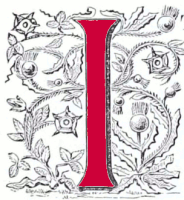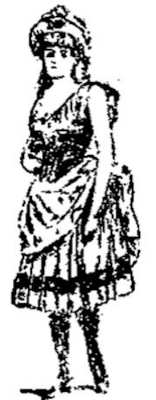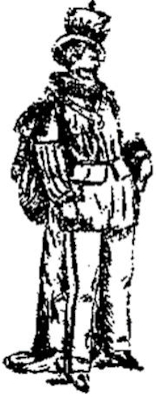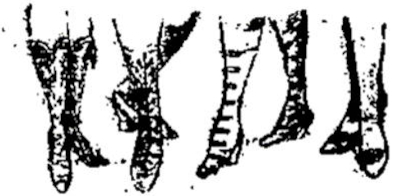This article has been transcribed from a copy of the Cardiff Times in the online collection of scanned Welsh newspapers 1804-1919 in the National Library of Wales, with grateful recognition of the free access accorded to all readers. Paragraph breaks have been introduced for easier reading and a decorative initial has been added.
The Authorship of this ’Samuel,” Its Illustrations, and their captions
The current writer of the 'Samuel' column lives in England and comes across as rather pompously English, and not at all Welsh. He makes almost no effort to shape his articles for a readership in South Wales. He also does not provide illustrations with his text, as some other writers have done, and we have seen efforts by the editor to add appropriate images to certain earlier articles where possible. This time the editor has taken another path and inserted highly topical and local references into the captions to images which have only a very general relevance to the text. But thanks to editorial intervention, these captions now name the principal parts in Joseph Parry’s new Welsh opera Arianwen. The captions also quietly celebrate Dr Joseph Parry, who, from working in the mines and ironworks from the age of nine, became a very successful composer and performer in Wales, who is still widely known around the world for his hymn-tunes.
Amusement at Victorian disapproval of the exposure of legs on stage must not distract us from the fact that Samuel's account of changes in British theatre are valuable as evidence to the historian.
Literary references
Samuel, or to be more precise certain writers of the column 'Samuel's Sentiments', often make fun of old men who praise times past at the expense of the present. (They sometimes quote Horace’s Ars Poetica, 173: laudator temporis acti 'a praiser of time past [when he himself was a boy].' (See Samuel 121 'Samuel on Playgoing and Playgoers' and 134 'Samuel on boots and their wearers'). Here, we have a long complaint on the subject of a supposed decay in British theatre since the writer's younger days, following hard on complaints about those who complain of an even earlier decline. It is not always clear whether Samuel is writing about 'serious' theatre or pantomime.
In keeping with its theatrical theme, the article quotes from Shakespeare several times and its literary allusions are 'the human form divine' from William Blake, 'The Divine Image', while lines from Tennyson's 'The Brook', 'men may come and men may go / But I go on for ever', are parodied as 'Pieces come, and pieces go,/But gags go on forever.' The lines attributed to 'a modern versifier' may be Samuel's own.
Other references in the text
Olla podrida: a Spanish or Portuguese stew, made with chickpeas or beans, and assorted meats; thus a diverse mixture of things.
‘a Nitrate King or a popular jockey’: John Thomas North, 1842-1896, known in his day as 'The Nitrate King,' was a mechanic in Leeds who made a fortune from a nitrate company in the Atacama Desert in Chile. See also 'Samuel on Things He Regrets' (9th February 1889). The high-earning popular jockey is probably Charles Wood (1856-1945), who in 1887 sued the Licensed Victuallers' Gazette and Hotel Courier for £5,000, over allegations of race-fixing, and although he won the case, was only awarded a mere one farthing damages.
‘dubbed a rogue and vagabond by Act of Parliament’: under the Vagabond Act of 1572, 'all fencers, bearwards, common players of interludes, and minstrels (not belonging to any baron of this realm, or to any other honourable person of greater degree), wandering abroad without the license of two justices at the least', were subject to be 'grievously whipped and burned through the gristle of the right ear with a hot iron of the compass of an inch about.' —— David Skilton

t has long, sir, been the firm opinion of certain actors, who spend many weary months resting, that the British drama is slowly but surely going to the dogs. Which dogs are to be the recipient of the histrionic property, sir, I have not yet been able to discover. These actors, sir (and their name is legion), will tell you, in the strict confidence begotten of a soothing beverage of a spiritous nature, that in their day the stage was worth calling a stage, and the work they did was a credit and an ornament to the profession they condescended to adorn. These grumblers belong to the heavy school of acting favoured by our fathers and grandfathers, who took their drama seriously, and could compare the relative methods of one actor with another with a critical acumen not known to the ordinary playgoers of the present day. Actors in those days were on familiar terms with their auditors, and were wont to discuss with them in convivial fashion the merits and demerits of their various performances. And in the old stock days, sir, the actor's vocation was a varied one. In these hard-working times the public was regularly treated to what a modern versifier calls 'The real legitimate and Billy Shakespeare's plays, and verily each player in his season played many parts.

The hero. (Not Walter Mostyn)
Whether these ancient Thespians were accurate in their canine prognostication is a matter for longer debate than my present space permits; but it is an undeniable fact that the form and fashion of the English drama has undergone a material change since the old days of stock companies. In the old times the pantomime was a thing written and produced with some respect to juvenile auditors, and was looked forward to from season to season. A book was written, and people – actors and actresses – were engaged to play it. The Merry Clown and his welcome 'Here we are again' were greeted with genuine laughter by young and old alike, and the story preceding his antics was of a rational character. Now-a-days his occupation's gone; his fooling is done by 'speciaJity' people in the opening, and he finds himself doing a 15 minutes’ harlequinade to a beggarly array of empty benches. People to-day who are engaged to appear in pantomimes virtually have a book written to play them.
And the drama? That, sir, has changed also. In place of the plays our fathers watched with interest, we are presented with comedy drama (why not tragedy-farce, sir, as well?); farcical comedy, comic opera, and burlesque. And which takes the most money? Comic opera and burlesque. And why? Because the public live at such a rate in the nineteenth century that they have neither the time nor the inclination to take their dramatic fare seriously. To them the theatre is a place of amusement pure and simple. It is a place to rest in, a place where the worry of business may be cast to the winds, and the antidote of laughter obtained as a remedy for the bane of high pressure. Fun, and plenty of it, is the motto of the average playgoer of to-day, and it is to this feeling for pleasure and amusement that the drama of legs owes the hold it has obtained upon the playgoing public. The modern frequenter of the theatre does not care to think, and as serious drama, and the so-called comedy drama, requires some mental effort on the part of the spectator, it is always launched upon the sea of public opinion with much uncertainty. Plays, which to earnest students of the age contain[s] strength and beauty, have failed to attract the public, and have after a brief travel been relegated to oblivion. The few pieces of serious interest that have really succeeded of late years have owed much of their success to the individual effects of a particular actor. In serious drama at the present day it is frequently the actor or actress, who makes the play, and not the author. Your stage-managing actor is a sore destroyer of your author's lines and theories.

The heroine (Not Arianwen).
And the drama of legs -- what is it? It consists, broadly speaking, of two parts — comic opera and burlesque. The former is of several grades, and, with the exception of the admirable nonsense written by Mr W. S. Gilbert, it is principally noticeable for the baldness of its dialogue, the insanity of its lyrics, and the want of originality in its plots. The latter consists of such an olla podrida of nonsense, jokes, comic songs, dances and gags, and an unlimited display of the human form divine on the part of principals and chorus in tights and trunks. No one ever expects rationality in a modern burlesque, and provided the leading lady – usually cast for the leading boy — is possessed of a neat figure, a pretty face, and the semblance of a voice, she is as likely to pile up a fortune as a Nitrate King or a popular jockey. In addition to this, sir, she may marry a duke — and probably live unhappy ever afterwards. Dukes and earls are particularly partial to the drama of legs and its exponents. Whether we owe the drama of legs to the modern comedian — a distinct type from the comedian of the past — or whether the comedian to the drama of legs, I am not prepared to state; but it was a certainty that in connection with the form of dramatic art in question there has risen up a school of comedians whose efforts live solely in the direction of personal eccentricity. So far does this culture of personal peculiarities go in the drama of legs, sir, that parts and pieces (so to speak) are specially put together for the purpose of allowing an eccentric comedian to go on and play himself, as it were. The amount of mental effort and study saved to the comedian by this phase of the drama of legs, sir must be enormous.
No manager interested in the drama of legs can hope to succeed without a chorus of damsels willing to wear the garments — often limited in quantity — of burlesque. Students of anatomy find the theatre a pleasant place wherein to combine study of the human form and recreation, for not even the most carping critic can accuse the modern leg-drama pioneers of restricting their artistes in the direction of anatomic display. They are peculiar people are these chorus supports of the drama of legs, and live in a world entirely their own. They are capable of looking more inanimate than anything on earth, and the regularity with which they all do the same things in identically the same manner is positively astounding. There is nothing like it out of the drama of legs.

Burlesque monarch. (Not TwmShon Twm.)
Yet, sir, they live and flourish, and are to be found on the stages of our theatres during the largest proportion of the dramatic year.
The producers – one can hardly say authors — of the drama of legs all work on the same lines. They give a catchy title to their work, such 'Guy Fawkes,' 'Lancelot the Lovely,' and 'Little Doctor Faust,' which names serve to indicate that the piece has some connection with the subject its title parodies or burlesques. Those who seek for a story in this form of the drama of legs will be woefully disappointed. It is not considered a necessity. Besides it might interfere with the vagaries of the comedians, who, if they had to preserve it, would not be able to gag ad libitum, and that would be fatal in a drama of legs. To misquote the poet,
'Pieces come, and pieces go,
But gags go on forever.',
No one is sacred; they use the names and peculiarities of our greatest men for the purpose of ridiculing them before the public, and of gaining cheap applause at their expense. It is indeed a disgrace to the playgoers of to-day that such should be the state of affairs, but so it is.

Therefore, sir, it seems to me that those people who tell us that the stage is in a better state than it was in the days of our fathers, are labouring under a sad delusion. The social status of the actor may be a better one than in the times when he was dubbed a rogue and vagabond by Act of Parliament, but that, I fancy, is largely due to the socialistic tendency of the age. Amusement and not education is the cry from all sides of the theatre, and until the world moves at a slower rate it will continue to be so. The drama of legs feasts the eyes, please[s] the [?senses] and supplies sensuous Idleness and real weariness with pleasant sensations — hence its tremendous hold upon the public. It is no use preaching against it; there it is, a necessary evil of the times, and there it will remain until a radical change comes over the play-going community.
Last modified 6 April 2022